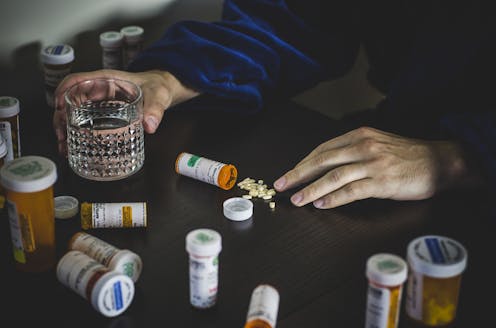Taking certain opioids while on commonly prescribed antidepressants may increase the risk of overdose
- Written by Ismaeel Yunusa, Assistant Professor of Clinical Pharmacy and Outcomes Sciences, University of South Carolina

Taking oxycodone at the same time as certain selective serotonin reuptake inhibitors (SSRIs), a commonly prescribed class of antidepressant, can increase the risk of opioid overdose[1], according to a study my colleagues and I[2] published.
Doctors prescribe the opioid oxycodone[3] to treat moderate to severe pain after surgeries and injuries or certain conditions like cancer. Opioids are also a common drug of abuse[4]. In the U.S., over 70% of drug overdose deaths in 2019 involved an opioid.
Because many patients with depression also experience chronic pain[5], opioids are often coprescribed with antidepressants[6] like SSRIs. Prior research[7] has shown that certain SSRIs, namely fluoxetine (Prozac or Sarafem) and paroxetine (Paxil, Pexeva or Brisdelle), can strongly inhibit a liver enzyme crucial to the proper breakdown of drugs in the body, including oxycodone. The resulting increased concentration of oxycodone in the blood may lead to accidental overdose.
To see whether different types of SSRIs might affect a patient’s risk of overdosing on oxycodone, my colleagues and I examined data from three large U.S. health insurance claims databases. We included over 2 million adults who began taking oxycodone while using SSRIs between 2000 and 2020. The average age of the group was around 50, and a little over 72% were women. A little over 30% were taking the SSRIs paroxetine and fluoxetine.
We found that patients taking paroxetine or fluoxetine had a 23% higher risk of overdosing on oxycodone than those using other SSRIs.
About 30% of patients[8] with chronic pain experience adverse drug interactions while taking opioids. Other types of drugs have been shown to increase the risk of overdose and other harmful interactions. These include some muscle relaxants[9] commonly used to treat pain, benzodiazepines[10] commonly used to treat anxiety or poor sleep and some antipsychotics[11] commonly used to treat schizophrenia or bipolar disorder. Similarly, in 2019, the Food and Drug Administration required drugmakers to include new warnings[12] on using gabapentinoids, a class of drugs commonly used to treat epilepsy and pain, concurrently with opioids and other drugs that suppress the central nervous system. This mandate was due to an increased risk of dangerously reduced breathing rates[13] that can result in overdose and death when these drugs are taken together.
The findings from our study offer insight on which of the most commonly used antidepressants could most likely lead to opioid overdose. Further investigation of how other drugs interact with opioids could help doctors and patients better understand which drugs are safe to take at the same time.
References
- ^ increase the risk of opioid overdose (doi.org)
- ^ and I (scholar.google.com)
- ^ oxycodone (www.cdc.gov)
- ^ common drug of abuse (www.cdc.gov)
- ^ also experience chronic pain (doi.org)
- ^ coprescribed with antidepressants (doi.org)
- ^ Prior research (dx.doi.org)
- ^ About 30% of patients (doi.org)
- ^ muscle relaxants (doi.org)
- ^ benzodiazepines (doi.org)
- ^ antipsychotics (doi.org)
- ^ include new warnings (www.fda.gov)
- ^ dangerously reduced breathing rates (theconversation.com)
Authors: Ismaeel Yunusa, Assistant Professor of Clinical Pharmacy and Outcomes Sciences, University of South Carolina

